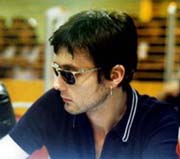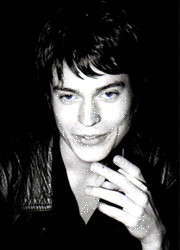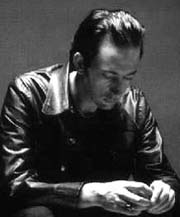

getting inside
of their heads about the new CD.....
![]()

Brett Anderson Nina & Ariana
Full Transcript
of London Suede interview Discs
![]() Can you tell us a bit about Electricity, the
first single from the new album?
Can you tell us a bit about Electricity, the
first single from the new album?
Simon - Electricity is our first single.
(Band sing bass riff intro to Electricity)
Simon - That bit came about later but we had the track around for quite a
while before that didn't we?
Richard - Yes we did. It's just little things to funk it up. The first demo
that was done was quite garagey punk with lots of guitars and stuff.
It's an uptempo fiasco. It's very good.
Brett - Sonically it's possibly quite consistent with the rest of the album.
It's got a lot of bottom end and a lot of bass hooks and stuff like that. The bottom
end of the tracks was something we were working on specifically on the album. We
were working the tracks from the bottom upwards rather than from the top downwards
if that makes any sense
![]() It's
interesting in that it's the first Anderson / Codling / Oakes co-write. How does
that work, who does what exactly?
It's
interesting in that it's the first Anderson / Codling / Oakes co-write. How does
that work, who does what exactly?

Richard - We all did little bits and bobs. The verse is very neil and the
chorus is very me and the singing's very brett.
Simon - The gap at the end is all mine.
Richard Oakes Nina & Ariana
Richard - It's a shame having credits
on a record because everybody
works on it and does their own bit and stuff.
Mat - Right where's my credit then?
Richard - Mat played the . . .
Simon - Fool.
Richard - . . . sleigh bells on it which are very low in the mix.
Mat - I didn't play most of the bass on it so I should get a
negative credit.
Richard - Coconut shells you played didn't you, but they're mixed very
low, it sounds like Adam and the Ants.
Mat - It should have that thing at the end, "No thanks to Mat
Osman."
![]() Head
Music is the first album you've recorded without Ed Buller. Why change
Head
Music is the first album you've recorded without Ed Buller. Why change
producers at this stage?

Brett - We changed producer cos we just thought we'd gone as far as we could with
Ed really. We just fancied a change, it was just a fresh scene
and that.
We almost half intended to change producers on the last album but because we had
line up changes and stuff like that we needed to have a certain continuity and seemlessness
about it and Ed seemed to hold it together. Ed was the right producer for the sort
of songs that we were doing on the last album.
Neil Codlling Karena Bernard
The way we were working on songwriting
on this album we felt as though the sonics needed to change.
We tried a few people out, we tried Steve Osborne out and he just did something really
special with one of the tracks, Savoir Faire. He just managed to get hold of an element
of it that I knew was there but I knew the band couldn't get hold of on their own
and so he seemed to be the man for the job. So we got him in.
![]() You've
talked about Savoir Faire being one of, if not THE key track on the album. Why is
this?
You've
talked about Savoir Faire being one of, if not THE key track on the album. Why is
this?
Richard - There are quite a few tracks that break a lot of ground for us as
a musical collective and Savoir Faire's one of them.
The first demo of it that Brett did at home in his shed was the strangest thing you'll
ever hear in your life. This spiky odd keyboard sound he'd come up with covered in
reverb and far too loud and load and loads of singing but it was a really exciting
thing to hear. We took it to the band and pumped it up and gave it a whole load of
testosterone as it were . . .
Brett - One of my favourite songs on the album is called Savoir Faire. If
I was going to have a blueprint for the whole album that's exactly how it would sound.
It's quite sort of mechanical but quite groovy at the same time. But it still keeps
a lot of the dynamics of the music of Suede as well, so Savoir Faire is my fave.
![]() Can
you tell us a little about some of your other favourite tracks?
Can
you tell us a little about some of your other favourite tracks?

Brett - Another favourite of mine is a song called Can't Get Enough which
is just looking back at a period of utter hedonism and debauchery and
realising that you've become this sort of monster and laughing at it really. Take
it in your stride. And it's this punky, edgy song about being a greedy bastard.
Matt Osman
Richard - The roots of it and where the song came from was very much a cross-over
period from doing stuff like Coming Up to doing stuff like Head
Music. Again, when we came to record it we did something different with it. It wasn't
all full on, stomping, Filmstar or whatever.
I think musically it's got the same sort of slink as something like She but the good
thing about the chorus is it's so singalong but it's not one that opens out, it's
not like Electricity where there's a change of key and everything. The Can't Get
Enough chorus is much more of a contained animal within a . . .
Mat - Cage.
Richard - . . . within a container. It's a slug in a container.
Mat - The rhythm track on the third verse is the five of us jumping up and down
on a bridge and loads of pairs of scissors.
Simon - The scissors are all the way through aren't they?
Mat - No the scissors are only on the third verse.
Simon - Are you sure about that?
Mat - Yeah, I fucking hate those scissors.
Simon - I love the scissors.
Mat - All the way through it's like everyone, "ooh I like that scissors
sound."
Richard - A little hint for an edit if it's released as a single, snip out
the third verse.
Mat - The third verse is just stamping and scissors.
Simon - I like the scissors.
Brett - I really like a track on the album called Everything Will Flow which
is quite a traditional sounding Suede song. It's just a big chorus sort of thing,
it's supposed to be a big karmic sort of thing, just watching the world go by. I
think it's a pretty successful piece of music.
We managed to use strings without it sounding like, oh here comes the string
section. I didn't want to use strings on the record as a big padding or used as a
signpost to say here comes the important part or something. When we used strings
it was a definite line that we'd written.
Every string part we used on it, it was almost like we were using strings as a riff
rather than as a padding, and that's a perfect example. Neil wrote this line on a
keyboard which is the intro string riff to Everything Will Flow. We just translated
it to a string section and eq'd it strangely so it didn't sound like Radio 2.
 Simon Gilbert
Simon Gilbert
Richard - In the end we all just sat down and played it how we thought it
would be without talking or thinking about it too much. And it only took one day
to record and it's got some really nice live strings on it. You know there's a lot
of sampled stuff on the record but the strings on that are live and it came together
really well.
Simon - That happens occasionally. You try and do it loads of different ways
and six months down the line you play it how you played it in the rehearsal room.
Richard - The good way that that came about was it was the first one we started
with and then it got forgotten about for a few months so when we came
back to it it was very much just go in there and do it.
Mat - We'd done so much electronic stuff by then.
Simon - It was quite a breeze to actually play real instruments.
Richard - I don't think there's a synth on it, it's just there, the five of
us jamming away.
![]() Aside
from a trumpet player and string section, did you use any other outside musicians
on this album?
Aside
from a trumpet player and string section, did you use any other outside musicians
on this album?
Mat - Pretty much all the other instruments one of us or Steve could play.
Simon - Yeah, Steve played quite a lot, like the scissors for example.
Mat - Exactly, no one plays the scissors quite like Steve Osborne.
Mat - We all did a bit of shouting.
Simon - My debut was "shout". I shouted "shout" on Savoir
Faire. And a lot of stomping as well.
Mat - I played some guitar on She's In Fashion, I don't know whether we ever
used it in the end.
Richard - I think it's on there.
Simon - I'm sure we did.
Mat - Neil played a bit of bass on electricity.
Simon - Brett played guitar.
Mat - Brett played a lot of guitar.
Richard - I played just a ride cymbal on its own on Elephant Man but it wasn't
used in the end.
Simon - It was much tighter that mine.
Mat - It's a bad sign when you're playing one cymbal and it's still not good
enough.
Mat - Richard puts his finger in his ear when he's recording, like a folk
singer. I've never seen anyone do it before.
Richard - I have to have it turned up really loud to get the vibe and then I
have to put my fingers in my ear because I can't hear myself.
Mat - You really should have filmed that.
Simon - That would have been good, yeah.
Mat - A real hey nonny nonny bit.
Richard - You know, it's embarrassing and I don't know if I'll be doing it
live.
Mat - Oh yes you will!
Simon - Oh baby!
Richard - We're gonna take it right down now.
Simon - You're great when you do your backing vocals, you do it really rock.
Mat - You can't stick your finger in your ear if you're playing the guitar
as well.
Richard - I'll have to get someone else to do it.
![]() Mat,
you've been quoted as saying that Down is your favourite track on the album, why
is that?
Mat,
you've been quoted as saying that Down is your favourite track on the album, why
is that?
Mat - I think it might be the best produced thing on the album. It's the one
thing that sounded fifty times better after Steve got his hands on it.
Richard - Every part on it and everything about it is really subtle but the
effect it has is far from subtle, you know.
Mat - And it's also Steve Osborne's favourite track because in his own words
"I've never done a track with the word loonies on it before." He's really
happy about that. Strange things turn producers on they really do.
![]() What
about She's In Fashion, the next single?
What
about She's In Fashion, the next single?
Neil - I think She's In Fashion is one of Suede's more brazen attempts to
be a pop band really.
Simon - A summer smash I reckon, I hope so
Richard - Probably the most pop song you'll ever hear in your life and the
way it was done. That was one that for a while the thing we wanted to do with it
was kind of harsh. We tried a few odd keyboard noises and funny little spiky guitar
riffs and at the end it was like going back to how we'd imagined it in the first
place and the first band demo we did.
The actual first demo at all, it wasn't a song it was a piece of music on a tape,
Neil sent me was about 15 minutes long and it was the strangest thing I'd ever heard
in my life. Strange kind of, you know "gloopy strings" it was called, it
was a gloopy string riff over the top and a kind of Hawaiian bass line and nice acoustic
guitar over the top.

Mat - We spent fucking months on that track and just couldn't get it right.
We must have tried about eight different versions of it. It's just really weird listening
to it now cos it just sounds straight and completely untouched and unforced. It just
seems ridiculous to go through six months of three studios, and eighty attempts to
make it sound as un-studio as that. It was hard work that one.
Richard - But it's one of those songs that will be on the telly.
Mat - Or possibly on the radio.
Simon - On the Clothes Show I think you'll find, I think it's guaranteed a
six week run.
Neil - I had this string riff and beats and Brett wrote the melody to it.
And however we tried to do it, we tried to make it a lot more obscure and a lot more
dancey but it didn't really suit it. We tried about ten different versions of it
when we did the record and it just didn't work.
![]() The title
track is one of the most singalong things you've ever done. Do you think it might
become a terrace anthem?
The title
track is one of the most singalong things you've ever done. Do you think it might
become a terrace anthem?
Mat - I don't know if that's the sort of thing that football fans usually
chant, to be honest.
Simon - "Give me head!"
![]() What
did you make of all the media frenzy over the mystery of the album title?
What
did you make of all the media frenzy over the mystery of the album title?
Brett - What happened with the releasing one letter at a time was actually
a bit of an accident. It comes across as a bit of a scam but it was actually just
a bit of a joke between me and Saul from Nude. He just asked me for the album title
and I just told him I was going to give it to him one letter at a time and it got
kind of leaked out and turned into this thing like we were trying to create this
big scam, but it wasn't supposed to be like that. But it kept people interested and
kept people juggling letters for a bit and they came up with some funny suggestions
for the album title. I like Head Case,
that was really good. There was some really funny ones, I can't remember them
. . . Hairy Shirts or something, there was some fucking great ones.
There are several songs that might surprise people, perhaps most obviously Elephant
Man. Would you agree?
Mat - That was a really simple one, Neil did most of that on his own.
Richard - It's an important one to have on the record as well, about the perception
of the band. I think when the idea for having Elephant Man on the album came up it
was like yeah, you know it broke a little bit of ground for us and made everything
a bit freer about how we work in the future.
Mat - I just thought it was really nice because we've done four albums now
and there's almost this unwritten rule that you have to get a bit more mature in
your songwriting and the things you write about and I thought it was quite nice to
come up with the least mature song we've ever done.
Richard - We're not a mature band.
Mat - It's quite funny as well, I know the subject matter's not particularly
funny but it always makes me laugh.
![]() Neil,
have you got any particular favourites from the album?
Neil,
have you got any particular favourites from the album?
Neil - Indian Strings is one of the later tracks on the album but it's one
of the first songs that was written for the album, quite early on. And it's just
one that Brett came up with on his own in the very early stages, we hadn't formulated
any ideas about the record. But it just kind of stood on its own and I think it's
a really good piece of songwriting and I think it could be sung by anybody really.
It's quite a simple ballad, very simple
idea, quite open and honest and I think you could imagine it being done by someone
like Simon and Garfunkel. It's quite a timeless song and it's one of those things
that could fit on the record in any shape or form.
We started off making this record and we said we won't have any real strings on it,
but it's one of those songs that warranted it and I think it's very much a Suede
song but like most of the songs on the album it's quite an advancement from Coming
Up for instance. I think it's a great little song and that's that.
![]() Crack
in the Union Jack has caught a lot of people off guard by its brevity, any comments
on that?
Crack
in the Union Jack has caught a lot of people off guard by its brevity, any comments
on that?
Mat - It's just meant to be a very small very simple, cold little nasty song.
A good one to finish on.
Richard - A poke in the eye for anyone who's enjoyed the album.
![]() After
seven years in the public eye, you've still managed to come across as being quite
a cool, credible band. How?
After
seven years in the public eye, you've still managed to come across as being quite
a cool, credible band. How?
Brett - I think we just don't smile in photographs, that's the only reason.
![]() Nevertheless,
you've still maintained an incredibly loyal fanbase.
Nevertheless,
you've still maintained an incredibly loyal fanbase.
Brett - We've got a lot of loyal fans that listen to the heart of the music and get
a lot of comfort out of it and stuff like that and really feel he music. I dunno
really. I don't think we've ever done anything in a cheap way. I don't think we've
ever cheapened Suede but that's not to say that I want Suede as some sort of pompous
thing that thinks it's some untouchable thing, it's not like that. I don't think
we've done anything that's been musically dishonest really.
I've always tried to evolve it rather than do big turnarounds or big changes that
don't mean anything that are just stylistic changes. I've almost tried to make the
music speak and for everything to come from the music. If you don't make records
then nothing else follows, if you make good records then everything else follows.
And it's always been the music first and the music's just informed everything else.
![]() You've
had an enormous amount of success in Europe, particularly compared to many other
British bands of a similar level over here. Why have Suede succeeded where other
haven't?
You've
had an enormous amount of success in Europe, particularly compared to many other
British bands of a similar level over here. Why have Suede succeeded where other
haven't?
Brett - I think we get a lot of success in Europe cos I think the music's
got a universal appeal, I've always liked to think that, I've always flattered myself
with that thought. I don't know if it's always been a hundred per cent true.
There's a lot of cultural references in some of the words and that but the general
feeling of the music is about emotion. I think there's a lot of British bands that
are quite blinkered and I don't think we've ever been that blinkered. The raw sort
of feeling of the music is just simple, you don't need to know about a scene in Britain
to get it, it's just there or it's not, you either like it or you don't and that's
it. It doesn't require that much thought.
Places like Scandinavia it went mad on the last record, I don't really know why that
is specifically. I think it's probably because they're all depressed sex maniacs
and the songs do something for them in that way.
![]() Finally,
what are your plans for worldwide domination?
Finally,
what are your plans for worldwide domination?
Brett - What are our plans for conquering the world? Dunno, haven't got any plans
really. We're gonna go and do some dates in Europe soon and some festivals, play
the album to people. Every time we start a tour we always say oh we're not gonna
tour that much because we want to get on with making the next record. You come out
of the studio and you just have a load of ideas for the next one. And we've already
got a pretty clear idea about how we want to do the next one so we wanna get on with
that really, but we'll probably end up touring till we're about 95.